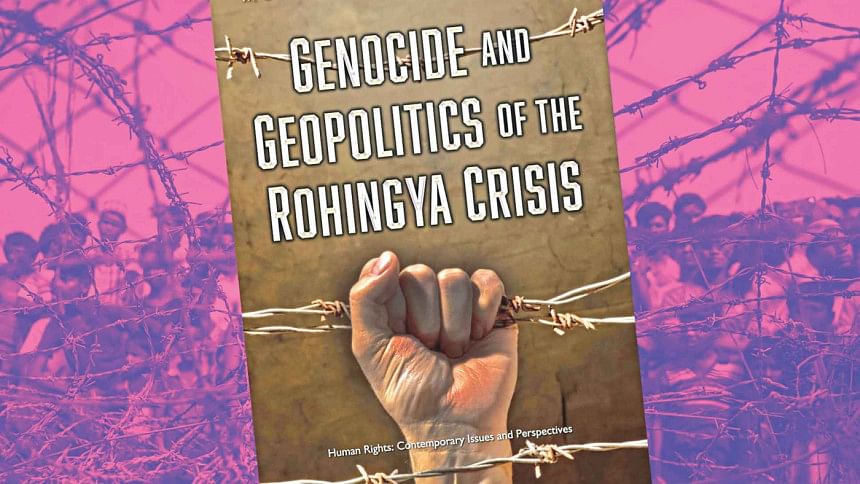The Politics of Losing Home

In August 2017, the Myanmar military perpetrated a genocide on the Rohingyas, an ethnic group residing in Northern Rakhine. Large numbers of Rohingyas were killed, women and girls were raped, villages burnt and upwards of 800,000 men, women and children were driven out of their homes. They crossed the border into Bangladesh to save their lives and are now sheltered in camps in Teknaf and Ukhia, in the southern tip of Bangladesh.
Although this outrageous event was sort of a 'final solution', atrocities on Rohingyas have a long history. The first mass expulsion took place in 1977-78 when 250,000 were driven across the border. Most of them were sent back through negotiations. However, following the second mass expulsion in 1989-90, many of the 250,000 refugees could not be sent back. Meanwhile, the Burmese Citizenship Act of 1982 disenfranchised the Rohingyas of their citizenship. Under continued atrocities by the military and the local Rakhines led by extremist Buddhist monks, a slow exodus continued till 2016, when another 80,000 were expelled. At least 300,000 Rohingyas were displaced in Bangladesh before 2017.
In his book Genocide and Geopolitics of the Rohingya Crisis (Nova Science Publishers, 2020), the scholar General Aminul Karim uncovers the broader canvas of the topic, painstakingly consulting the plethora of existing literature, interviewing various experts, and offering his own analysis and conclusions.
General Karim begins with a background of the Rohingyas in Arakan and of modern Burma including its various insurgencies. He then moves on to the strategic importance of the area. Being resource rich, the oil and gas fields are controlled by an enterprise, in which the senior military officers who run the country have economic interests. Major world powers and big corporations have their eyes on these resources. Added to this is the location along the Bay of Bengal, which is vital for Chinese access to the Indian Ocean. Removing Rohingyas strengthens the control of these forces on the area and consequently, upon the resources.
Examining the legal issues in subsequent chapters, the author concludes that the Myanmar regime is certainly guilty of committing genocide, but because Myanmar is not a member of ICC and because implementation of the ICJ decision depends largely on the UNSC, punishment of the perpetrators cannot be guaranteed.
Chapters 11 and 12 enter into the main theme of the book—geopolitics, and the possibility of a local Muslim insurgency. Through the BRI, coupled with large investments, China has established a firm grip on Myanmar. This allows China to bypass the Malacca strait choke point. China's adversary India wants alternate access to its North-East through Myanmar and a possible land route to ASEAN countries from Moreh in Manipur. The United States, on the one hand, is pressurising Myanmar by funding Muslim insurgency through Saudi Arabia, and on the other, Western oil giants are cosying up with the Myanmar regime to get a hold on the oil and gas fields.
The author considers the Arakan Rohingya Salvation Army (ARSA) as a "well organised Muslim insurgency" and suggests that Myanmar might someday ask for US intervention to contain them. This seems a little farfetched. So far, ARSA's only major act has been the supposed attack on some security outposts that triggered the 2017 genocide. It is even possible that the Myanmar military allowed this to happen to create a pretext for the pogrom. In containing myriad insurgencies in the country, Myanmar would probably find China a more reliable partner than the US. However, US overtures could give Myanmar an additional advantage.
In his concluding chapters, through interviews, the author suggests some solutions. Sadiqul Islam of Laurentian University, Canada, considers the expulsion of the Rohingyas into Bangladesh an act of war. Professor Delwar Hossain of Dhaka University thinks even a limited war on this issue is quite unlikely. This reviewer has looked into history, and seen that no such problem involving a crime of genocide has been resolved peacefully. The issue is likely to be prolonged and in such a case, the growth of an insurgency and recruitment of young zealots by international terror groups is a distinct possibility.
To resolve the problem, General Karim suggests that great powers like China, Russia, the US, and the UN and other international organizations work together to ensure citizenship for Rohingyas and their repatriation, and federalism and autonomy in Myanmar. Alas, the Myanmar state looks unlikely to proceed this way; nor are the great powers showing any such inclination. The author agrees that this sounds like tall-talks, but he would still like to be optimistic. Unfortunately, going by the proceedings so far, there seems little space for such optimism.
All said and done, this book is unique in as much as it has the intellectual dimension of an academic. It also reflects the strategic perspective of a professional who has had a decades-old career in military and security matters. A remarkable work, this book would be useful both for researchers as well as policymakers who can devise strategies to handle the issue in the years to come.
Md Touhid Hossain is former Foreign Secretary.

 For all latest news, follow The Daily Star's Google News channel.
For all latest news, follow The Daily Star's Google News channel. 



Comments